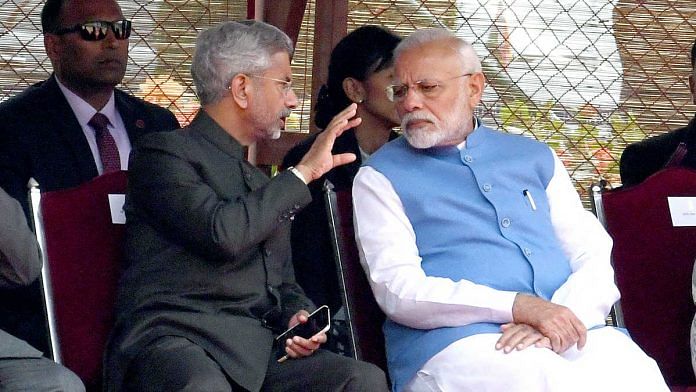New Delhi: Strategic autonomy, openness and inclusive economic growth should be the guiding principles of India’s foreign policy as it seeks to become a front-ranking power in Asia in the next decade, according to a new paper by a group of leading policymakers, analysts and thinkers.
The 53-page document, titled ‘India’s Path to Power: Strategy in a World Adrift’, was released by the Centre for Policy Research Saturday.
The authors, who have worked together on the paper since May 2020, include former National Security Advisor Shivshankar Menon, Lt. Gen. (Retd.) Prakash Menon, former foreign secretary Shyam Saran, academics Sunil Khilnani and Srinath Raghavan and analysts Yamini Aiyar, Nitin Pai and Ajit Ranade.
The paper discusses challenges to India’s Neighbourhood First policy, how the Taliban takeover in Afghanistan will create more problems for India’s neighbourhood in the coming decade and how India can tackle the double border threat from China and Pakistan.
Also read: Want India trade pact to be at par with those with Quad partners: Australian Trade Minister
India must expand strategic autonomy
Some of the authors published a similar paper in 2012 titled ‘Non Alignment 2.0: A Foreign and Strategic Policy for India in the Twenty First Century’. However, instead of using the term “non-alignment”, they have opted for “strategic autonomy” in the latest paper.
The paper interprets strategic autonomy in terms of “sober political and strategic judgement”. It also interprets it in terms of expanding one’s economic footprint.
“A period of geopolitical change and transformation carries risks but also creates spaces for emerging countries like India to expand its strategic autonomy, that is, to enhance its ability to take relatively autonomous decisions on matters of vital interest to it,” states the paper.
“Critical decisions must be taken now so that the coming decade sets the stage for India’s emergence as a front ranking power in Asia and beyond,” it adds.
“Instead of shrinking its economic footprint owing to concerns about sectoral interests at home, India must strive for strategic autonomy stemming from competitiveness within a global economy,” the paper further notes.
Also read: India, China should properly handle differences, move towards stability, envoy Sun Weidong says
India should not become a ‘pale imitation of China’
The paper criticises the idea that India needs a new international identity free of the effects of colonialism. “Rather than offering a pale imitation of China’s claims to being a civilisational state, traumatised by colonialism, India should affirm the strength and resilience of its historic national identity,” the paper states.
India should not fall prey to China’s totalitarian trajectory, it adds, and instead, it should leverage partnerships with the US, Europe and Japan to enhance flows of capital, technology and knowledge resources.
The paper also notes that India is “less inclusive today than at any point in its history” and moving towards a “no-holds-barred contest for power”. It warns that this can “enmesh” the country in internal conflicts that would sap its resources and also undermine its international aspirations.
On the issue of contested land borders with China and Pakistan, the paper suggests India expand its strategic options by focusing on its maritime capabilities.
New Delhi can leverage its “favourable location straddling the sea lines of communication from the Indian to the Pacific Oceans”, it states.
Also read: Indian team to visit Pakistan this week for SCO anti-terror exercise, but only as ‘observers’
India should continue to promote SAARC, Neighbourhood First policy
Continuing the globalisation of its economy and participating in regional trading pacts will help bolster the Indian economy, the authors say.
For example, India should continue to promote SAARC and push harder on its Neighbourhood First policy. “This is particularly relevant to the management of the sensitive relations with Pakistan and with Bangladesh,” they note.
India’s moves to revive trade talks with the US, EU, Gulf Cooperation Council and most recently Australia, have been interpreted by some analysts as India’s way to offset the effect of its decision to opt out of the Regional Comprehensive Economic Partnership (RCEP).
The paper also criticises the extent of aatma nirbhar Bharat, or a self-reliant economy.
“While economic self-reliance, or Atmanirbhar Bharat, is a laudable objective, it must not lead to a high cost low quality economy which was the hallmark of India’s economic record before the economic reforms and liberalisation of the early 1990s,” the paper warns.
Growth strategy that is more ecologically sustainable
The paper criticises India’s current development model and strategy of economic growth and to address this, it suggests leveraging advanced technologies like artificial intelligence and machine learning.
Getting an early start on reorienting its climate change diplomacy, will help India gain a leadership role among developing countries, says the paper.
The Quad could possibly acquire an economic dimension, too, but should also include countries like Singapore, Indonesia and Vietnam, “forming a Quad-plus in practice”, it adds.
Also read: ‘Australia, India don’t want to constrain China’: PM Morrison says Beijing can be Quad ‘partner’



